Earlier today, America’s Voice and Latino Decisions released the second wave of the 2016 Battleground Poll [Toplines HERE and Crosstabs HERE, and summary deck HERE] .
In coming days, we will be releasing the results of polling done in a number of key states featuring competitive presidential and U.S. Senate races. The national poll of 3,729 Latino registered voters was fielded between August 19th and 30th using a blend of web, land, and cell interviews with interviews conducted in English and Spanish based upon the discretion of the respondent. The poll’s margin of error is +/- 1.6 percentage points.
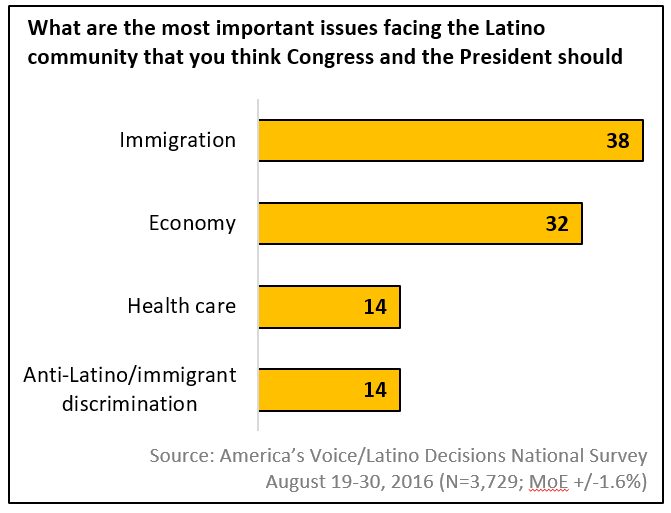
The poll results indicate the degree to which Latino political behavior continues to be shaped by immigration policy and politics and how this, in turn, leads to diverging opinions about the Democratic and Republican Parties and the parties’ presidential candidates. Specifically, in response to an open ended question asking what the most important issues facing the Latino community that Congress and the president should address, 38% cited immigration and deportations and 14% offered anti-Latino and immigrant discrimination. The economy and jobs was the top issue for 32% of respondents, followed by health care (14%).
As we have found in prior polling, the salience of immigration stems from the personal connections that Latino voters have to the undocumented community. When asked if they knew a family member, friend, co-worker, or other acquaintance who is an undocumented immigrant, 59% responded yes. Given these connections, it makes sense that parties’ handling of immigration is shaping perceptions of the parties and their presidential candidates.
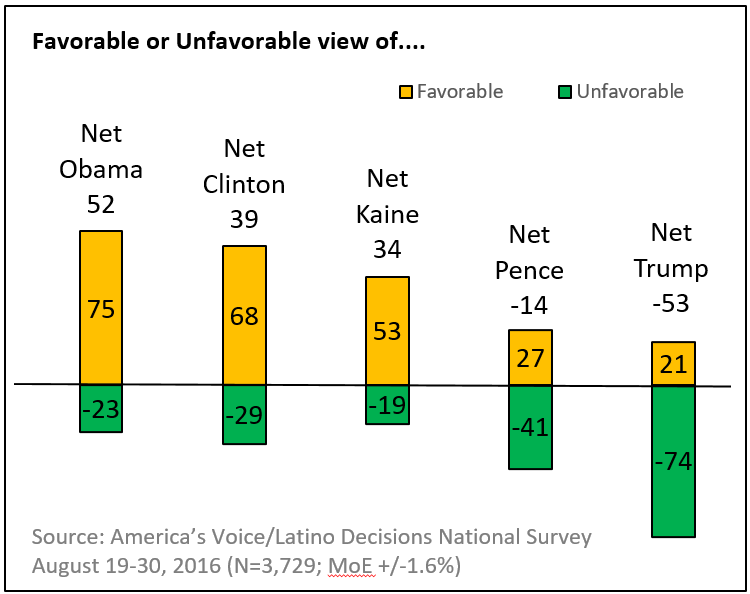
President Obama remains quite popular as 75% of respondents either have a somewhat or very favorable view of the president (23% somewhat or very unfavorable). Democratic presidential candidate Hillary Clinton also enjoys strong support among Latino voters (68% very or somewhat favorable and 29% very or somewhat unfavorable). On the other end of the spectrum is Donald Trump. Just 21% of Latino voters view the Republican presidential nominee very or somewhat favorably, while 74% have a very or somewhat unfavorable opinion of Trump.
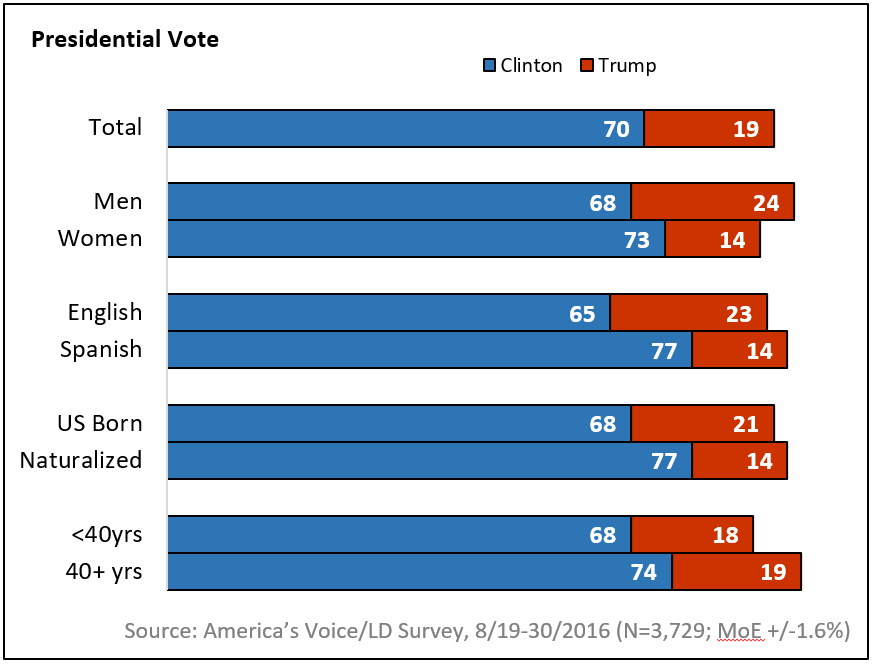
Consistent with these perceptions, Clinton is poised to win the votes of 70% of Latino voters compared to 19% for Trump. Although less well known, the profiles of the parties’ vice-presidential candidates, Democrat Tim Kaine and Republican Mike Pence, are similar to those of their running mates (Kaine total favorable 53%, total unfavorable 19%; Pence total favorable 27%, total unfavorable 41%).
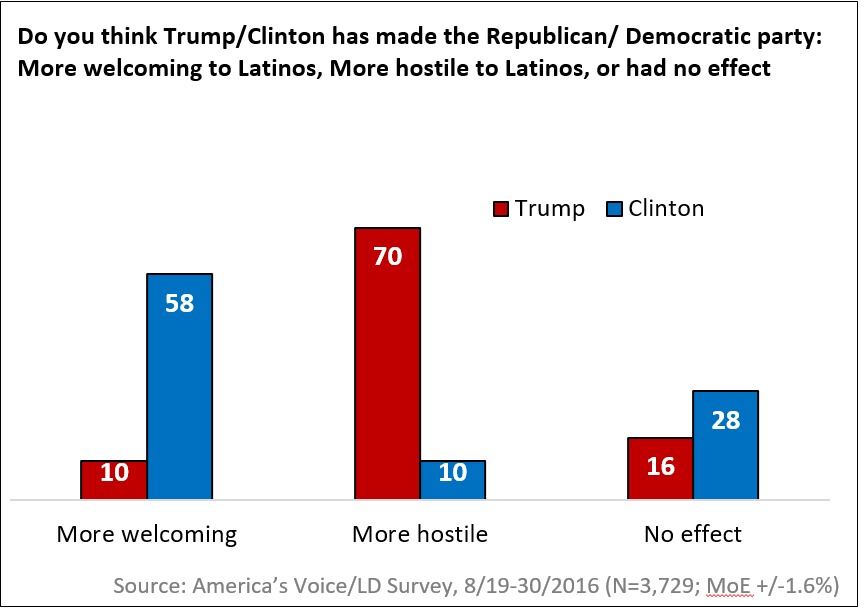
Certainly, recent Republican presidential candidates have struggled to gain the support of Latino voters. However, Trump appears to be further marginalizing the party with this electorate. When asked if Trump has made the Republican Party more welcoming or hostile to Latinos, 70% responded that he has made the party more hostile compared to 10% who think that Trump has made the party more welcoming. In contrast, 58% of Latino votes think that Hillary Clinton has made the Democratic Party more welcoming to Latinos and just 10% choose more hostile.
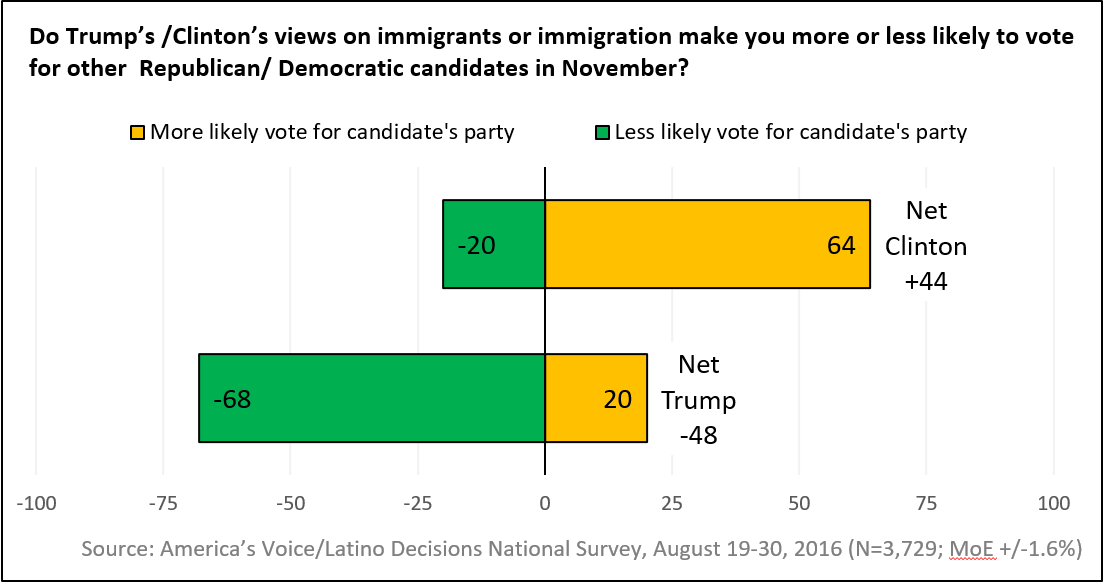
The tone set by the parties’ presidential candidates also has the potential to reverberate up and down the ballot. When asked if Clinton’s views on immigrants or immigration made them more-or-less likely to vote for other Democratic candidates in November, 65% indicated that they would be much more or somewhat likely to vote for other Democrats as compared to 20% responding they would be either somewhat or much less likely to do so. The opposite holds for Trump’s impact on the likelihood of voting for other Republicans. Just 20% responded that they would be much more or somewhat more likely to vote for other Republicans because of Trump’s views on immigrants and immigration, while 68% said they would be much less or somewhat less likely to support other Republicans this cycle.
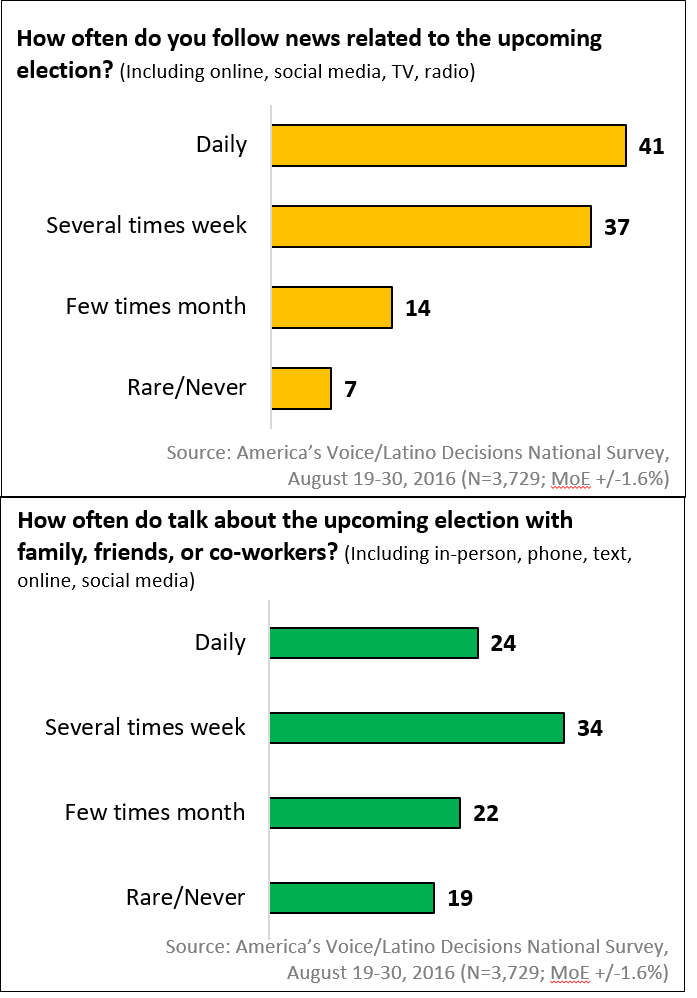
The poll results also suggest that Latino voters are highly engaged in the election. In response to a question administered to half of respondents asking how frequently they are discussing the election with family members, friends, and co-workers, 24% reported that they do so every day and 34% responded that they have these conversations several times a week. With respect to consuming election related news (a question that was posed to the other half of the sample), 41% indicated they do so every day and 37% reported that they follow news about the election several times a week. Despite this interest, 60% of Latino voters have not been contacted in the last few months by a campaign, political party, or other organization asking them to vote or register to vote.
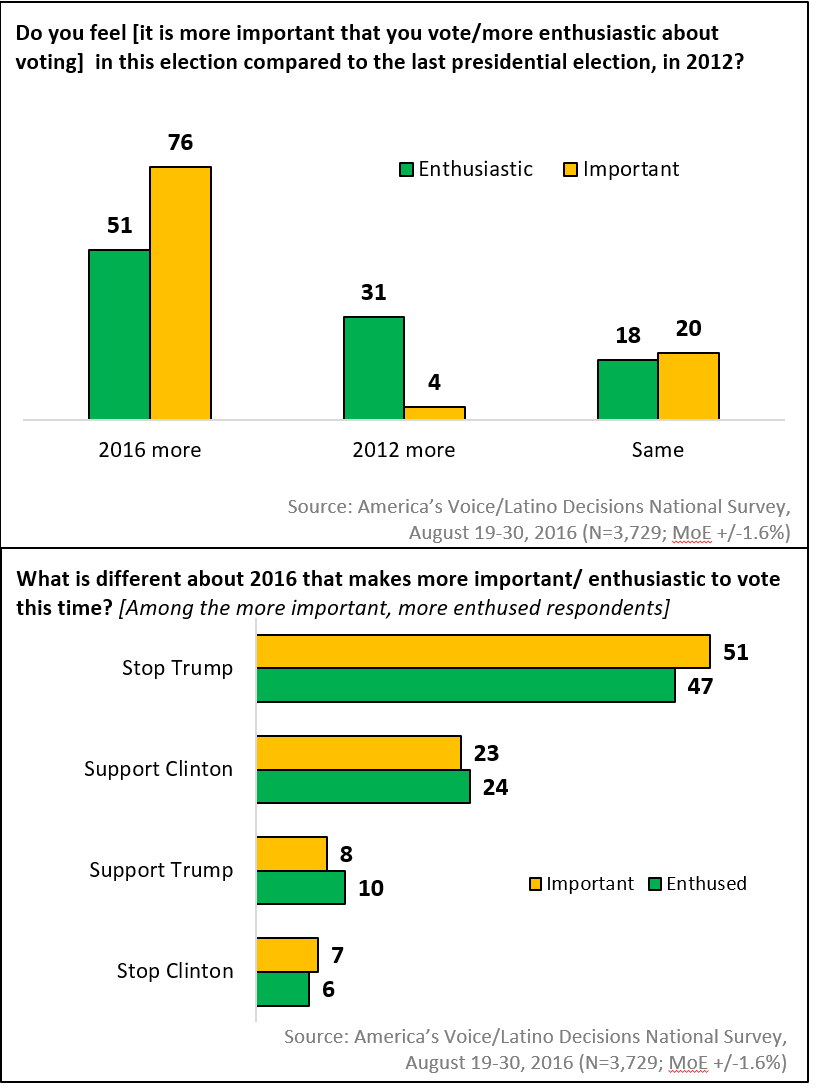
Lastly, to assess how Latino voters are approaching the election, a split sample set-up was used to measure the degree to which Latino voters think that it is more important that they vote in 2016 as compared to 2012 and the degree to which they are more enthusiastic about voting in 2016 as compared to 2012.
Among those receiving the more important question, 76% responded that it is more important that they vote in 206 as compared to 2012. In response to an open-ended follow up question asking they think it is more important that they vote in 2016, 51% said stopping Trump and 23% said supporting Clinton.
Among those who were asked if they were more enthusiastic about voting this election, 51% said that they are more enthusiastic in 2016 as compared to 31% who indicated that they were more enthusiastic in 2012. In response to a follow up question asking why they were more enthusiastic about voting this election, again, stopping Trump was the most frequent response (51%), followed by supporting Clinton 23%.
Far from loving the Republican presidential nominee, the poll provides strong evidence of the degree to which Donald Trump is harming the Republican Party’s reputation and electoral prospects among Latino voters. Not only do the vast majority of Latino voters think that Trump has made the GOP more hostile to Latinos, Trump’s toxicity has the potential to spill over to other Republican candidates, while simultaneously ensuring that more Latinos turnout to vote to register their displeasure with the Republican presidential nominee.
Dr. David Damore is a Senior Analyst at Latino Decisions. He is Professor of Political Science at the University of Nevada, Las Vegas, and a Brookings Mountian West Fellow. Damore has been cited as an expert on Latino voting by the Las Vegas Sun and L.A. Times, and identified by FiveThirtyEight as a lead Nevada expert.


